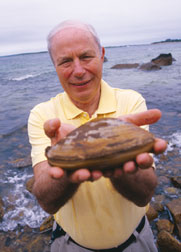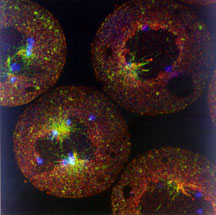 |
 |
|
 |
 |
 |
 |
 |
|
 |
 |
 |
 |

 |
 |
 |
 |

|
 |
Return to Table of Contents
|
 |
|
Nobel Laureate Avram Hershko
|
Avram Hershko Wins Nobel Prize in Chemistry
Embryology course alumnus, Irwin Rose, shares award for discovery of ubiquitin-mediated protein degradation
When the Royal Swedish Academy of Sciences recently announced MBL summer investigator Avram Hershko as a winner of the Nobel Prize in Chemistry, it felt as though someone in the immediate family had just, well, won the Nobel Prize.
“The word spread quickly across our campus,” said MBL Director and CEO, William T. Speck. “When someone you know as well as we know Avram receives a Nobel, you feel a sense of pride; you experience the excitement firsthand.”
Hershko, a professor of biochemistry at the Technion-Israel Institute of Technology in Haifa, Israel, is a long-time member of the MBL family. He has been conducting his research in the Whitman building every summer since 1991.
Hershko shares this year’s chemistry prize with Aaron Ciechanover, also of the Technion, and Irwin Rose, an MBL Embryology course alumnus and researcher at the University of California, Irvine. The Nobel honors the discovery of the ubiquitin system of regulated protein degradation. This fundamental process influences key cellular events such as the cell cycle, malignant transformation, and responses to inflammation and immunity.
“This is wonderful news,” said Robert Goldman, a cell physiologist at Northwestern University and a close MBL colleague of Hershko’s. “Avram’s discoveries over the past few decades have revolutionized our thinking about the central importance of the ways that cells breakdown their proteins.”
 |
|
Today, ubiquitin is known to help regulate cell division, to aid in controlling embryonic development, and to help maintain the immune system.
|
|
Ubiquitin, a protein within cells that helps them clean out unwanted proteins, is what first inspired Hershko to come to the MBL back in 1991. He came here to learn more about the role that ubiquitin plays in the cell division cycle.
“Many important cell cycle regulators are degraded in a programmed fashion, which allows the cell cycle to progress,” explained Hershko. The first of these proteins, known as cyclin B, was discovered by Tim Hunt, Joan Ruderman, and their colleagues working independently at the MBL in the early 1980s. Hunt won the Nobel Prize in 2001 for this discovery.
By 1989, MBL scientists had developed a means of studying cyclins and the cell cycle in the test tube using the eggs of local surf clams (Spisula solidissima) as models. It turned out to be exactly the system that Hershko needed to study what role, if any, ubiquitin played in the process.
In collaboration with Robert Palazzo, now at Rensselaer Polytechnic Institute, Hershko determined that cyclin is degraded by the ubiquitin system during the cell cycle. Working with Joan Ruderman of Harvard University, he later identified a specific ubiquitin ligating complex that “targets cyclin B for degradation at the end of mitosis”—the final phase of cell division.
With the help of his colleagues, Hershko discovered the ubiquitin system and eventually determined that it influences major physiological processes in the body. He recalls watching scientific interest in ubiquitin cascade after its discovery. “I knew that the impact was big,” he said. “When I first started working on ubiquitin, there were maybe ten papers on it a year. Now there are thousands a year.”
Today, ubiquitin is known to help regulate cell division, to aid in controlling embryonic development, and to help maintain the immune system. It is also implicated in diseases including cervical cancer caused by the human papilloma virus, and, possibly, autoimmune diseases. And what Herskho and his colleagues have learned about this important protein may someday help drug researchers develop therapies targeted at these diseases.
Of receiving the Nobel for his contribution to this important medical knowledge, Hershko said, “I wasn’t waiting for it, but I am very grateful for it.” He was picnicking at a kibbutz with his four granddaughters when he heard the news.
But don’t expect Hershko to rest on his laurels. He is currently studying the ubiquitin ligating complex in both clam eggs and cultured human cells in hopes of learning even more about cell division in general and cancer more specifically.
He is also leading the MBL-based Clam Project, an effort to sequence some of the surf clam’s active genes. The project, a first step toward sequencing the entire genome, is vital to the future of Hershko’s current research. “We are reaching a barrier in our work, unless we obtain this molecular knowledge,” he said, when the project first began. Hershko is collaborating with fellow MBL summer investigators Yosef Gruenbaum of Hebrew University of Jerusalem, Robert Palazzo, and Robert Goldman.
The goal of the Clam Project is to provide scientists with better knowledge of the clam’s active DNA. Such information is crucial to the study of the basic cellular processes involved in many diseases and may help lead to other important discoveries like Hershko’s.
Hershko’s and Rose’s recent receipt of the Nobel Prize makes them the fiftieth and fifty-first MBL-affiliated scientists to receive this award. Other Nobel Laureates who have found inspiration here include Tim Hunt, James Watson, Barbara McClintock, and Andrew Huxley and Alan Hodgkin.
|
|
| |
 |
|
 |
 |
|